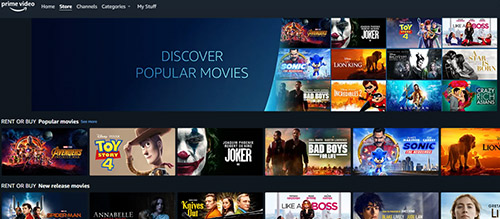Can Physical Media Survive in the Age of Streaming?
This article was written exclusively for The Film Magazine by Luke Hinton.
Digital media collectors, beware. If you’ve built up a strong collection of films and TV shows on digital platforms such as Amazon Prime Video or iTunes, you might want to reconsider – as in unsurprising news, Amazon have recently come out and said that you might not actually own them.
The revelation comes as Amazon remain embroiled in a lawsuit around Prime Video ownership, after they were sued in April for falsely advertising digital ‘purchases’ as permanent. Their lawyer David Biderman claims the Terms of Use clearly state that ‘purchasers obtain only a limited license to view video content’ that can be revoked at any time, but it’s sure to come as an unwelcome shock to those who purchase content on Amazon’s video platform.
Yet Amazon aren’t the first company to covertly announce that users will never own their purchases: iTunes faced similar controversy in 2018 as users’ movies began disappearing from their libraries after Apple’s licenses with certain studios ended. Not all hope was lost: the tech giant announced that these films could be kept forever if downloaded to an external device, but for digital collectors with hundreds of films on these platforms, that was simply not viable.
Yet while digital platforms restrict customers’ access to their purchases, there is one format that is thriving as an under-the-radar alternative: physical film and TV media. Yes, it may seem ridiculous to suggest that DVDs and Blu-Rays are playing second fiddle in today’s media landscape, but in the age of on-demand viewing, the amount of people going out of their way to purchase a film that they could rent on iTunes is sharply dropping. In the past twelve years, DVD sales have dropped by over 86%, and the uncertainty of 2020 has contributed to this even more – with digital sales overtaking DVD and Blu-Ray sales in the UK for the first time ever. Of course, this must be attributed in part to certain films, such as Trolls: World Tour and Scoob!, releasing digitally months before their physical releases, but it’s certainly a worrying prospect for those who crave the attachment to their favourite films through physical media.
Scoob! was one of the first major releases to head directly to Premium Video on Demand in 2020.
Despite these facts and the fears they present to physical collectors, it seems that physical media will endure, even if it plays a second-fiddle role to digital purchases. The British Association for Screen Entertainment (BASE) claimed physical media has been ‘remarkably resilient’, but for a format so rooted in tradition and sentimental attachment to cinema, this shouldn’t come as a surprise. As a film lover, sometimes watching an old favourite on Netflix – bombarded with a preview of their newest Original release just seconds after the credits start rolling – just doesn’t cut it, and there’s nothing better than having a classic film adorning your shelves. It gives film fans the chance to give a physical embodiment to symbolic texts that can mean so much to them, more than just two hours of entertainment – and for that reason, it’s hard to see physical media ever completely dying out. At least, not until it becomes financially unfeasible for studios to keep producing them.
And with the wealth of companies and communities that thrive off physical media, it doesn’t seem like that is coming any time soon. While the Official DVD Chart may betray the array of niche physical media being released, labels such as Arrow Video and Criterion are consistently releasing high-quality transfers of beloved classics, and with great success. Recent releases include a Blu-Ray of Martin Scorsese’s The Irishman from Criterion – complete with a 4K transfer, making-of documentaries and an essay booklet – and Arrow Video’s release of David Cronenberg’s infamous Crash – also restored in 4K, with plenty of making-of featurettes and archive material from the director’s past work. It’s proof that people out there value the experience of watching a film on a deeper level: not just ninety minutes then done, as services like Netflix encourage, but a more detailed, introspective look at cinema that examines far more than just the finished product. They give films that may have been otherwise forgotten a new lease of life, and immortalise classics for new viewers to discover.
Oscar -winning filmmaker Barry Jenkins picking his selections from the Criterion Closet on the Criterion Collection YouTube channel.
The work of these Blu-Ray labels hasn’t gone unnoticed, either: a film in the Criterion Collection becomes an unofficial component of film canon, joining the likes of Seven Samurai and Umberto D. in the annals of the cinematic hall of fame. And there’s a vast, passionate community of Blu-Ray collectors who are leading the fight to keep physical media alive.
One such group is UK Blu-Ray Steelbook Collectors, a community of 1,500 who share, sell and discuss the release of steelbooks: a type of Blu-Ray contained in a metal case, an often coveted and more expensive collector’s item. The passion of some of its members is astounding – their collections often hit the hundreds – and their attention to detail is no less impressive, with plenty of anger aimed at Zavvi, an online film retailer, whose lacklustre postage methods often draw the ire of the group’s members. When asked about why they value physical media, even in an age where everything can be purchased instantly online, their emotional attachment to cinema was clear. One member, Geoff, believes that ‘having the box, looking at the artwork, getting the behind the scenes/documentary extras makes a movie feel like a huge collaborative piece of art rather than a disposable piece of two-hour entertainment’ – proof that the desire to connect more with favourite films is something the streaming model simply can’t replace. Another member, Craig, echoed this passion, saying: ‘the tactile nature of something physical that I can display’ is a fundamental part of the Blu-Ray collecting experience. Yet most interestingly, it became clear that he ‘enjoy[ed] the movie experience more’ when watching on physical media – proof that something as simple as having a film on a disc can immortalise an experience that, on streaming services, can often be ephemeral.
That said, the covert industrial shift away from physical media must come as a concern to collectors like Geoff and Craig. The decision for Sony and Microsoft to release disc-free versions of their new PlayStation 5 and Xbox Series X consoles has been well-publicised, and even though versions with a disc drive are available, they’re considerably more expensive. These console developers are clearly more in favour of digital sales – which is obvious, because it limits games purchasing to just their online stores – yet the ramifications of creating a disc-free system are huge. It means people who are more casually invested in DVDs or Blu-Rays may be less inclined to buy them, and if future generations of consoles continue this disc-free trend, it certainly could lead to casual film-watchers stopping their physical media purchasing habits. The ease of piracy in the online age – with an HD stream usually just a click away for those less concerned about legality – also poses a threat. For someone without a sentimental attachment to physical media, why fork out money for something they can easily locate online?
All of this leaves the state of physical media in a precarious and uncertain position. It’s safe to assume that DVDs and Blu-Rays will never truly die out – collectors will always find pleasure in physically owning the films that mean so much to them – but the industry seems geared towards a digital revolution, particularly with the news that Warner Brothers are dropping all their 2021 releases on HBO Max, which will undoubtedly discourage consumers from purchasing a film they can stream for a much cheaper price. That said, no amount of industry pressure will ever outweigh the emotional importance that many attribute to film collecting, even if it continues to head towards being a niche market. No matter what happens, labels like Criterion and Arrow Video will continue breathing new life into old gems, and groups like UK Blu-Ray Steelbook Collectors will continue to discuss and share new purchases. The notion of community has been around since time immemorial: and even if physical media becomes the niche, it’ll always have an ardent, resolute following.
Featured image: Criterion Collection | YouTube
By Luke Hinton
You can support Luke Hinton by following him on Twitter: @lukeh38




